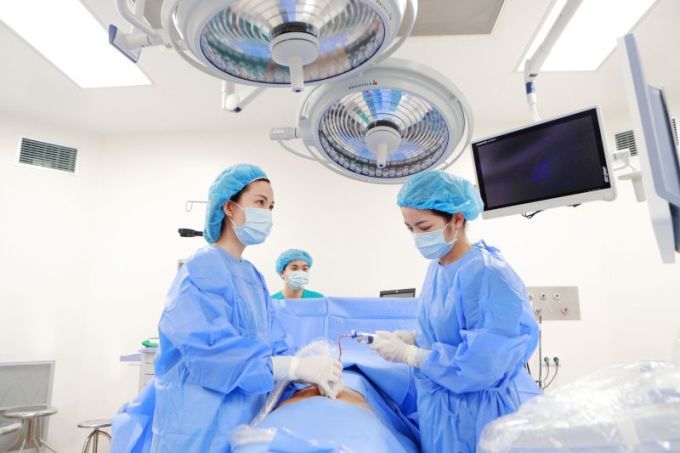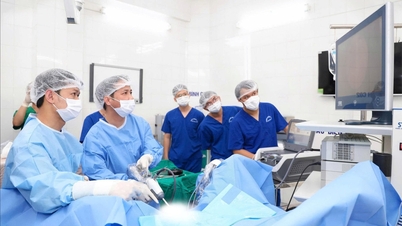Hanoi During a routine pregnancy check-up at week 20, a 29-year-old woman had low amniotic fluid. The doctor discovered that the fetus's urinary system was not functioning due to a genetic mutation inherited from the parents.
On August 17, Dr. Nguyen Thi Sim, in charge of the fetal intervention unit at Hanoi Obstetrics and Gynecology Hospital, said this was the first time Vietnamese doctors had identified a rare gene that causes renal tubular dysplasia, a loss of kidney function in fetuses in the womb.
The mother had a history of stillbirth. This time, after discovering oligohydramnios, she tried to increase the amount of amniotic fluid by drinking more water and adjusting her diet, but these measures were ineffective. At nearly 22 weeks pregnant, the patient went to the Fetal Intervention Unit, Hanoi Obstetrics Hospital, and the examination did not detect any pathology, no amniotic fluid leakage, no vaginal bleeding. On ultrasound, the fetus had two kidneys but no urine was seen in the bladder, and the amniotic fluid was gone, so the uterus was tightly constricting the fetus.
"We are trying to answer the question 'is the lack of urine in the fetal bladder a consequence of long-term lack of water to drink causing kidney dysfunction or is it a previous kidney disease causing amniotic fluid depletion'," said Dr. Sim.
The pregnant woman was then diagnosed by the doctor with "suspected oligohydramnios due to fetal kidney abnormalities". Nephrology and genetics specialists consulted with multiple hospitals and predicted that the fetus's condition was poor due to the risk of kidney dysfunction and genetic abnormalities related to the fetus' urinary system. However, the pregnant woman did not want to terminate the pregnancy and asked to return home for further monitoring.
Two weeks later, the fetus was still growing, the patient came back for a check-up, hoping to find the cause of the fetus's urinary system stopping working, and find a way for the baby to continue developing in the mother's womb.
Doctors then apply the method of infusing the solution into the amniotic cavity, to fully evaluate the morphological abnormalities of the fetus on ultrasound when there is enough amniotic fluid. At the same time, this method is also to diagnose gene mutations and chromosomes related to the urinary system of the fetus.
When there were enough genetic results combined with diagnostic imaging, the fetus was concluded to have bilateral renal dysfunction due to a homozygous ACE gene mutation inherited from the parents. Clinical manifestations were that the fetus could not excrete urine, and the condition of amniotic fluid quickly returned after infusion into the amniotic cavity.
"Medically, this means both parents carry the recessive gene and pass it on to their children," said Dr. Sim, adding that there is a 25% chance that their children will be born with a severe form of the disease.
In this case, the baby is still growing, has a heartbeat, but the urinary system is not working. The doctor diagnosed that in the coming months, the fetus may be stillborn, and if the baby is born, it will be difficult to survive. The family requested to terminate the pregnancy at the 28th week.

Doctor Sim intervenes for a pregnant woman at the hospital. Photo: Doctor provided
According to Dr. Sim, when the cause of the genetic mutation that causes the fetus to have no amniotic fluid is clearly understood, the family will be carefully advised on prenatal screening and diagnosis methods to avoid repeating the abnormal fetal condition in subsequent pregnancies.
Amniotic fluid is made up of the fetus, amniotic membranes and maternal blood. However, the most important source of amniotic fluid is the urinary tract. By the 16th week of pregnancy, the fetal urinary tract becomes the source of amniotic fluid. That is why doctors must examine the fetal urinary system when the mother has oligohydramnios.
Oligohydramnios is a very serious condition that can lead to stillbirth. Oligohydramnios is often caused by genetic disorders, such as autosomal recessive renal tubular dysplasia (ARRTD). In this patient's case, the fetus carried a homozygous mutation in the ACE gene, a rare cause of ARRTD.
Dr. Sim believes that the discovery of this gene mutation is one of the great achievements of fetal medicine. Previously, there were many cases of oligohydramnios and stillbirths of unknown causes, which doctors could not explain. Now that the cause of the disease is known, it is possible to plan for the next pregnancy to avoid the same disease as the previous pregnancy.
"Like this couple, 10 healthy embryos have been screened and can soon be transferred to have children," said Dr. Sim.
Le Nga
Source link


![[Photo] Immerse yourself in the colorful musical world of “Secret Garden Live in Vietnam”](https://vphoto.vietnam.vn/thumb/1200x675/vietnam/resource/IMAGE/2025/10/18/1760805978427_ndo_br_thiet-ke-chua-co-ten-41-png.webp)


![[Photo] Closing ceremony of the 18th Congress of Hanoi Party Committee](https://vphoto.vietnam.vn/thumb/1200x675/vietnam/resource/IMAGE/2025/10/17/1760704850107_ndo_br_1-jpg.webp)
![[Photo] General Secretary To Lam attends the 95th Anniversary of the Party Central Office's Traditional Day](https://vphoto.vietnam.vn/thumb/1200x675/vietnam/resource/IMAGE/2025/10/18/1760784671836_a1-bnd-4476-1940-jpg.webp)
![[Photo] Collecting waste, sowing green seeds](https://vphoto.vietnam.vn/thumb/1200x675/vietnam/resource/IMAGE/2025/10/18/1760786475497_ndo_br_1-jpg.webp)


































































































Comment (0)